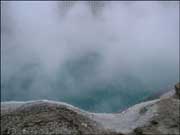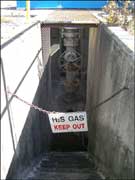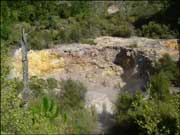5. The Dissolved Compounds
The
Wairakei geothermal field contains lots of hot water and steam that contain
chemicals. These chemicals are dissolved into the water deep underground.
They can be both helpful and harmful.
How they are helpful
- The chemicals allow the pressures and temperatures underground to be worked out, especially when from hot surface springs
- The chemicals allow electricity to flow through the hot water. Therefore it is possible to plot the extent of underground geothermal water. This has been widely used at Wairakei and across the whole Taupo Volcanic Zone
How they are harmful
Geothermal water and steam is so hot it can cause severe burns. Even the equipment and machinery gets very hot.
Also the chemicals in the water can cause problems, especially when the temperature and pressure drops
For example
- Silica
Silica is dissolved in hot deep thermal water. At Wairakei it starts to form on surfaces the water temperature falls below 130 oC. Controlling silica formation is a major factor in determining the efficiency of power generation. - Hydrogen Sulfide gas
This poisonous gas is colourless and at low levels smells like rotten eggs. However at high concentrations, it quickly stops your sense of smell making it very dangerous. Because it is heavier than air it builds up in low lying areas. - Carbon dioxide Gas
This is the most common gas in geothermal water. It is denser than air so it builds up in low lying areas. It has no colour and no smell. It kills by stopping people getting enough Oxygen.
The problems of removing hot water
Extra hot water and steam has been removed from Wairakei since the mid 1950's. This has had some effects on the local area.
For example
- A drop in the level of underground hot water
- A drop in the underground pressure
- Sinking of land
- Changes to geysers, hot pools, mud pools and streams
- Changes in the numbers of plants and animals in the Waikato
- The Waikato River is a little warmer.




